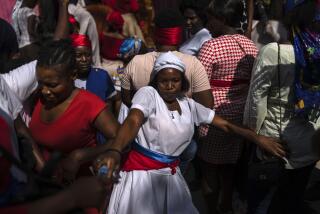AIDS: A GLOBAL ASSESSMENT : HAITI AND THE CARIBBEAN : Male Prostitution and the Heterosexual Community
- Share via
At the entrance to a gully leading to a rank of slum shacks in Haiti’s capital city of Port-au-Prince, a traditional folk medicine healer has strung up a makeshift sign advertising AIDS treatments.
Business is good.
This is the harsh reality of the AIDS epidemic in the Caribbean, where many sufferers die undiagnosed and where folk remedies popularized by herbalists, witch doctors and voodoo priests flourish.
With scant medical facilities to treat other pressing medical problems, some Haitian hospitals will not accept AIDS patients, leaving their families to care for them as best they can.
“In some ways it is better if victims are not isolated through hospitalization but rather cared for by their families,” said Dr. Jean Pape, a member of the Cornell University Medical School faculty who has been researching AIDS in his hometown of Port-au-Prince since 1982.
“There is more humanity for the patient, and the families learn the disease is not contagious. They also learn to be careful themselves.”
Most of the Caribbean’s reported AIDS cases have been in politically tumultuous Haiti, population 5.4 million. But smaller island nations such as the Bahamas, Bermuda and Trinidad and Tobago have had a disproportionate number of AIDS cases as well.
Haiti has reported 851 AIDS cases, or 15.8 cases per 100,000 people, a case rate similar to that in the United States as a whole.
But Pape estimates that Haiti’s actual number of AIDS cases to date is closer to 1,500. His research leads him to believe that 10% of the adults in urban areas such as Port-au-Prince and 3% of Haitians in rural areas are infected with the virus. In contrast, the national infection rate in the United States is less than 1%.
New data suggests that the AIDS virus was introduced into the Caribbean primarily by homosexual contact between islanders and Americans. But now it is largely transmitted by heterosexual contact in Haiti, according to extensive studies.
“This is a disease that has travelled north to south,” said Dr. Ronald St. John of the Pan American Health Organization in Washington. “In one country after another, the first case reported was always, always, some local who had travelled to the U.S. and was gay.”
As a result of this data, researchers have abandoned earlier theories that AIDS could have originated in Haiti. This speculation arose because a number of Haitian men living in Miami were among the first AIDS patients diagnosed in the United States.
“As recently as 1983 . . . at no time did anyone imagine that AIDS could have come from the U.S. to Haiti,” Pape said. “Now we believe on the basis of good data that it was brought to Haiti by vacationing American homosexuals.”
Cornell researchers have also demonstrated the dramatic spread of the AIDS virus from male prostitutes into Haiti’s heterosexual community.
The rapid diffusion of the disease, according to Pape, appears to be a consequence of the common practice of economic prostitution, through which bisexual men in the hemisphere’s poorest country earn $15 a night to feed their families.
In 1983, Pape said, male bisexuals accounted for 65% of Haiti’s AIDS cases and women only 12% of the cases. But in 1986, 90% of the newly diagnosed patients were infected by heterosexual transmission and 40% were women. In Port-au-Prince, about 66% of the female prostitutes carry the AIDS virus, he said.
Prospects for AIDS control in the Caribbean are problematic, particularly in Haiti, which has the weakest health care system in the region.
The Haitian government has named a national AIDS commission and received a major boost with a $500,000 grant from the World Health Organization. But amid political turmoil, the country’s supposedly transitional military government rules but does not govern. As a result, Haiti’s AIDS assault is being directed by international organizations and private groups.
Haiti is also facing unexpected geopolitical problems because of its large number of infected prostitutes, many of whom are from the neighboring Dominican Republic.
Haitian officials have demurred from deporting infected prostitutes. They fear such action might trigger Dominican reprisals that could destroy the livelihood of thousands of Haitians who cross into the Dominican Republic for months each year to cut sugar cane.
For their part, the Dominicans are considering screening the Haitian migrants.
More to Read
Sign up for Essential California
The most important California stories and recommendations in your inbox every morning.
You may occasionally receive promotional content from the Los Angeles Times.













